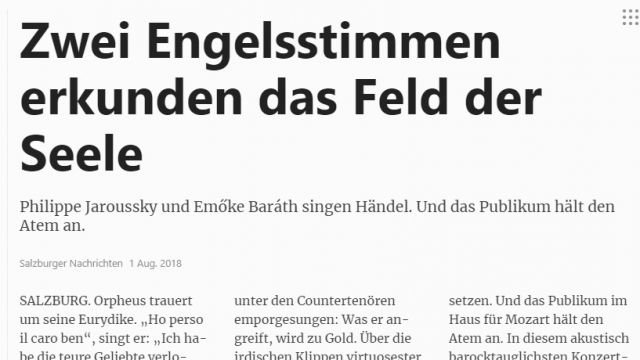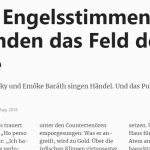2018-08-01, Salzburger Nachrichten, by n. A.
[…] Der Franzose hat sich zu einem Midas unter den Countertenören emporgesungen: Was er angreift, wird zu Gold. Über die irdischen Klippen virtuosester Koloraturen und heikler Sprünge erhaben, vermag er etwa den Zorn des Sesto in „Giulio Cesare in Egitto“ ebenso plastisch nachzuzeichnen wie das Glück des frischverliebten Ariodante. Seine größte Stärke offenbart sich jedoch, wenn er in Trauergesängen von epischer Länge – wie in “Scherza infida” – seine ganze Ausdruckspalette entfalten kann. Vokallinien, die Zeit und Raum außer Kraft setzen. Und das Publikum im Haus für Mozart hält den Atem an.
Source/Read more: [x]
Translation to English
This is a fan translation; no infringement of copyright is intended. We believe it fulfills the criteria for “fair use,” discussion and study. Translation by *L
Two Angel Voices Exploring The Landscapes Of The Soul
Philippe Jaroussky and Emöke Baráth sing Händel – and the audience holds its breath.
Salzburger Nachrichten 1 Aug. 2018
SALZBURG. Orpheus mourns his Eurydice: “Ho perso il caro ben,” he sings. “I lost my dear beloved.” There sound starts out like that of an angel. However, it doesn’t remain rigid; trandescending, within seconds, it blooms, and gaining volume, it fills all of the concert hall. All is shifting and scintillating. The introverted grief has found a vent. How Philippe Jaroussky creates that specific moment tells a lot about his art. The Frenchman has sung his way up to become a Midas among countertenors: everything he touches turns into gold. Sublimely beyond all earthly rocks such as coloraturas or tricky interval jumps, he is capable of sculpting Sesto’s ire from “Giulio Cesare in Egitto” just as the happiness of Ariodante’s who just fell fell in love.
However, it is in laments of epic proportions that his his greatest asset becomes apparent; that is when he gets a chance to use his whole palette of expressions, just as as in “Scherza infida.” Vocal lines that seem to suspend time and space – and the audience at the Haus für Mozart holds its breath. In this concert hall that is acoustically the most suited for Baroque, Jaroussky opened the sequence of recitals at the Salzburg Festival on Monday. Agreed, “recital” is an understatement when considering the scenic quality of the interpretation of arias by George Friedrich Händel. The Ensemble Artaserse cushions Jaroussky’s expeditions into the realm of the soul on its vibrant sound rich in in contrasts.
Historically informed performances can be engaging, if musicians – standing or not – seem on the edge of their seats, bringing a maximum of energy into the mix. Rocking spiccati, saturated, groovy off-beats – everything’s there.
And then, there is Emöke Baráth, a partner on equal terms. The Hungarian soprano is blessed with a timbre particularly suited for Baroque music that is dark in color but light as feather at the same time. At Almira’s Aria “Geloso tormento,” she completely takes back her voice, reaching regions free from any corporeality. We are listening to a queen’s inner monologue. She is powerful; however, she cannot overcome her own tormenting jealousy.
In Händel’s duets, the art of the two exceptional voices raises to higher power. At the end of a short, joint tour of Central Europe, Jaroussky’s and Baráth’s synchronicity can hardly be topped. Two voices merge as one, becoming a single, sensually charged sound – even in the brilliant “Vivo in te mio caro bene” at the end of the encores after two and a half hours. *) Barath storms off stage; Jaroussky smirks triumphantly. The audience is raging.
*) [translator’s note: “Vivo in te” is one of the greatest love duets of all time. Asteria and Andronico are incarcerated, and, ….. But I digress! However, it wasn’t the last encore.]
Source/Read more: [x]


